Program in Exercise Science
Major in Exercise Science
Exercise is an important part of our culture — for the young and old, the sports-minded, and those who just want to live healthy longer. We’re seeing a boom in the need for trained professionals in exercise careers, especially as the population matures. Our bachelor's degree in exercise science provides high levels of foundational knowledge and practical training to prepare you to work in this rewarding field. Through Cardinal Fit-our nationally recognized experiential learning program, rigorous course work, and an immersive internship, you'll be ready to influence the lives of your clients in the next step upon graduation.
As a graduate of the exercise science major, you'll be prepared to work in the health and fitness industry and pursue the American College of Sports Medicine Exercise Physiologist (ACSM-EP) exam, among others. By understanding how physiological and anatomical factors combine with interpersonal, social, and behavioral aspects of health, you'll be prepared to make a difference in your client's life.
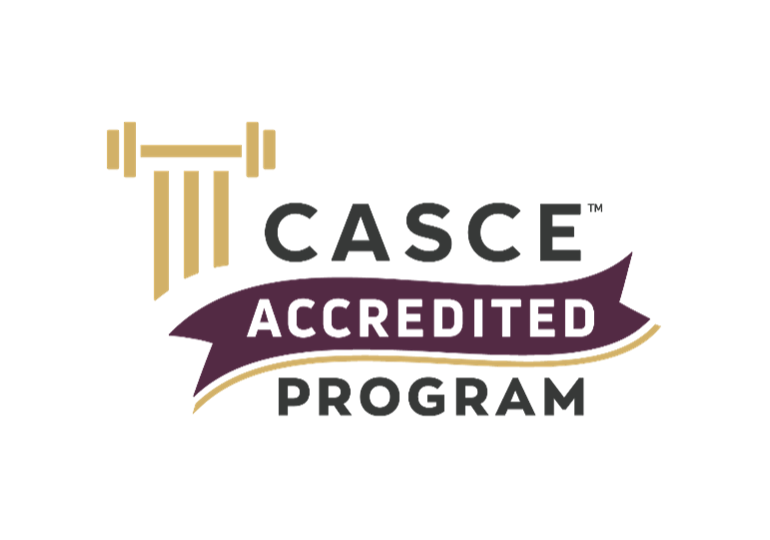
Strength and Conditioning Combined Program
If you want to focus your professional practice on improving athletic performance, consider the accredited Strength and Conditioning Combined program. By combining your exercise science major with the strength and conditioning minor, you'll gain the skills and knowledge needed to prepare for the National Strength and Conditioning Association Certified Strength and Conditioning Specialist (CSCS) credential. Our Combined Program is accredited by the CASCE and is the first program in Illinois to hold this program accreditation. The Combined Program Curriculum at North Central College prepares you with the knowledge and skills needed to challenge this respected certification to establish yourself as a strength and conditioning expert. The Combined Program uses a secondary admissions process and has limited capacity. Interested students should view the Strength and Conditioning Program tab for more information.
Graduate Study Preparation
If post-graduate study for careers in cardiac rehabilitation, physical therapy, athletic training, or occupational therapy interest you, our program will prepare you for graduate or professional school in these areas and others. You can also choose an accelerated 3+2 program leading to a B.S. in Exercise Science and a Master of Athletic Training Degree in 5 years. Whatever your path, you'll gain skills you can use in the next step of your education through your Exercise Science courses.
The B.S. degree in Exercise Science is designed for students with an interest in the human body and learning how to work with individuals so they can achieve more in their life through optimal health. Whether you are interested in a career as a fitness specialist or exercise physiologist, or planning to apply to a graduate healthcare or other graduate program, the Exercise Science major can help you get there.
Exercise Science Major Student Learning Outcomes
- Explain anatomical, biomechanical, and physiological concepts related to movement.
- Obtain, evaluate, and interpret discipline specific literature
- Administer and interpret fitness assessments for diverse populations
- Prescribe safe and evidence based programming to diverse populations
- Operate effectively in a professional setting
Exercise Science, B.S.
Exercise Science is broad discipline that studies the effects of physical activity on the human body. Exercise Science includes topics such as kinesiology, biomechanics, exercise physiology, fitness assessment, exercise training techniques and exercise programming for healthy and special populations. Exercise Science is a degree that prepares graduates to work in wide range of careers related to health, fitness and human performance.
For additional programs and courses in this department, see Kinesiology.
-
EXSC 101 - Foundations of Exercise Science
EXSC 101 - Foundations of Exercise Science
-
EXSC 255 - Organization and Administration in Exercise Science
EXSC 255 - Organization and Administration in Exercise Science
-
EXSC 345 - Training Techniques
EXSC 345 - Training Techniques
-
EXSC 347 - Physiology of Exercise
EXSC 347 - Physiology of Exercise
-
EXSC 410 - Fitness Evaluation
EXSC 410 - Fitness Evaluation
-
EXSC 420 - Exercise Program Design I
EXSC 420 - Exercise Program Design I
-
EXSC 447 - Exercise Medicine
EXSC 447 - Exercise Medicine
-
EXSC 490 - Internship Seminar
EXSC 490 - Internship Seminar
-
EXSC 497 - Internship
EXSC 497 - Internship
-
HTSC 100 - First Aid and Personal Safety
HTSC 100 - First Aid and Personal Safety
-
KINE 247 - Functional Anatomy
KINE 247 - Functional Anatomy
-
KINE 317 - Kinesiology
KINE 317 - Kinesiology
-
NUTR 101 - Introduction to Nutrition and Health
NUTR 101 - Introduction to Nutrition and Health
Optional Courses:
-
EXSC 295 - Research Practicum
EXSC 295 - Research Practicum
-
EXSC 390 - Special Topics
EXSC 390 - Special Topics
-
BIOL 201 - Anatomy and Physiology I
BIOL 201 - Anatomy and Physiology I
-
BIOL 202 - Anatomy and Physiology II
BIOL 202 - Anatomy and Physiology II
-
PSYC 250 - Statistics
PSYC 250 - Statistics
The Strength and Conditioning Combined Program can be completed by students who major in exercise science, apply to and are granted admission to the Minor in Strength and Conditioning, and who successfully complete the requirements for both programs. The program uses a secondary admissions process. Interested students will apply for admission to the Combined Program during their junior year. If admitted, students will complete the minor courses during their final year of enrollment at the college. Completing the Combined Program will prepare students for the Certified Strength and Conditioning Specialist (CSCS) credential, as offered by the National Strength and Conditioning Association.
Strength and Conditioning Combined Program Student Learning Outcomes:
- Student Learning Outcome 1: Explain anatomical, biomechanical, and physiological concepts related to movement.
- Student Learning Outcome 2: Obtain, evaluate, and interpret discipline specific literature.
- Student Learning Outcome 3: Demonstrate the ability to properly select, administer, and analyze exercise tests for athletes for a variety of sports.
- Student Learning Outcome 4: Demonstrate the ability to design an exercise program for a variety of sports while considering the training status, sport- season, and goals of
the individual. - Student Learning Outcome 5: Demonstrate the ability to identify optimal nutritional strategies required to optimize performance and recovery.
- Student Learning Outcome 6: Operate effectively in a professional setting.
The program is accredited by the Council on Accreditation for Strength and Conditioning Education. By 2030, candidates for the CSCS exam must have graduated from an accredited, NSCA-approved accrediting agency.
Students who are interested in applying to the Combined Program should contact Dr. Rachel Luehrs as early as possible during their time at the college for more information.
Exercise Science, B.S.
Exercise Science is broad discipline that studies the effects of physical activity on the human body. Exercise Science includes topics such as kinesiology, biomechanics, exercise physiology, fitness assessment, exercise training techniques and exercise programming for healthy and special populations. Exercise Science is a degree that prepares graduates to work in wide range of careers related to health, fitness and human performance.
For additional programs and courses in this department, see Kinesiology.
-
EXSC 101 - Foundations of Exercise Science
EXSC 101 - Foundations of Exercise Science
-
EXSC 255 - Organization and Administration in Exercise Science
EXSC 255 - Organization and Administration in Exercise Science
-
EXSC 345 - Training Techniques
EXSC 345 - Training Techniques
-
EXSC 347 - Physiology of Exercise
EXSC 347 - Physiology of Exercise
-
EXSC 410 - Fitness Evaluation
EXSC 410 - Fitness Evaluation
-
EXSC 420 - Exercise Program Design
EXSC 420 - Exercise Program Design
-
EXSC 447 - Exercise Medicine
EXSC 447 - Exercise Medicine
-
EXSC 490 - Internship Seminar
EXSC 490 - Internship Seminar
-
EXSC 497 - Internship
EXSC 497 - Internship
-
HTSC 100 - First Aid and Personal Safety
HTSC 100 - First Aid and Personal Safety
-
KINE 247 - Functional Anatomy
KINE 247 - Functional Anatomy
-
KINE 317 - Kinesiology
KINE 317 - Kinesiology
-
NUTR 101 - Introduction to Nutrition and Health
NUTR 101 - Introduction to Nutrition and Health
Optional Courses:
-
EXSC 295 - Research Practicum
EXSC 295 - Research Practicum
-
EXSC 390 - Special Topics
EXSC 390 - Special Topics
-
BIOL 201 - Anatomy and Physiology I
BIOL 201 - Anatomy and Physiology I
-
BIOL 202 - Anatomy and Physiology II
BIOL 202 - Anatomy and Physiology II
-
PSYC 250 - Statistics
PSYC 250 - Statistics
Exercise Science, B.S./M.A.T.
Students who complete the 3+2 program in exercise science and athletic training will complete the requirements for both degrees in 5 years. Admission to the MAT program is competitive and minimal requirements must be met by all applicants. For additional admission requirements, see the Master of Athletic Training Admission Requirements.
For additional programs and courses in this department, see Kinesiology.
-
EXSC 101 - Foundations of Exercise Science
EXSC 101 - Foundations of Exercise Science
-
EXSC 255 - Organization and Administration in Exercise Science
EXSC 255 - Organization and Administration in Exercise Science
-
EXSC 345 - Training Techniques
EXSC 345 - Training Techniques
-
EXSC 347 - Physiology of Exercise
EXSC 347 - Physiology of Exercise
-
EXSC 410 - Fitness Evaluation
EXSC 410 - Fitness Evaluation
-
EXSC 420 - Exercise Program Design
EXSC 420 - Exercise Program Design
-
EXSC 447 - Exercise Medicine
EXSC 447 - Exercise Medicine
-
BIOL 201 - Anatomy and Physiology I
BIOL 201 - Anatomy and Physiology I
-
BIOL 202 - Anatomy and Physiology II
BIOL 202 - Anatomy and Physiology II
-
HTSC 100 - First Aid and Personal Safety
HTSC 100 - First Aid and Personal Safety
-
KINE 247 - Functional Anatomy
KINE 247 - Functional Anatomy
-
KINE 317 - Kinesiology
KINE 317 - Kinesiology
-
NUTR 101 - Introduction to Nutrition and Health
NUTR 101 - Introduction to Nutrition and Health
-
PSYC 250 - Statistics
PSYC 250 - Statistics
- MATR 500 - Clinical Experiences in Athletic Training I*
- MATR 505 - Clinical Experiences in Athletic Training II*
- MATR 515 - Foundations of Athletic Training*
- MATR 525 - Therapeutic Interventions in Athletic Training I
- MATR 530 - Principles of Musculoskeletal and Medical Assessment
- MATR 535 - Therapeutic Interventions in Athletic Training II
- MATR 540 - Diagnosis and Management for Athletic Trainers II: Lower Extremity and Spine
- MATR 541 - Diagnosis and Management for Athletic Trainers I: Upper Extremity, Head & Neck
- MATR 550 - Medical Aspects of Athletic Training
- MATR 551 - Administration and Management in Athletic Training*
- MATR 600 - Clinical Experiences in Athletic Training III
- MATR 605 - Clinical Experiences in Athletic Training IV
- MATR 610 - Clinical Experiences in Athletic Training V: Immersive Experience
- MATR 620 - Principles of Nutrition and Strength and Conditioning for Athletic Training
- MATR 625 - Psychological Aspects of Athletic Training Practice
- MATR 640 - Special Topics in Athletic Training
- MATR 650 - Decision Making in Athletic Training
- MATR 655 - Applied Research Project in Athletic Training
*These courses apply towards both the undergraduate and graduate programs.
Strength and Conditioning, Minor
The minor in Strength and Conditioning provides an in-depth exploration of exercise testing and prescription for athletes. Graduates of the minor program are prepared for employment in the field of strength and conditioning. Students must follow the application process and must also major in Exercise Science to be admitted to the minor, which will admit a limited number of students each year.
A minimum of 20 credit hours, including:
-
EXSC 354 - Applied Performance Nutrition
EXSC 354 - Applied Performance Nutrition
-
EXSC 440 - Athletic Testing and Program Design II
EXSC 440 - Athletic Testing and Program Design II
-
EXSC 471 - Fieldwork in Strength and Conditioning
EXSC 471 - Fieldwork in Strength and Conditioning
-
EXSC 490 - Internship Seminar
EXSC 490 - Internship Seminar
-
KINE 497 - Internship in Strength and Conditioning
KINE 497 - Internship in Strength and Conditioning
The Human Performance Lab is located in Wentz Science Center and includes the following:
Click the Virtual Campus Tour to see inside the Human Performance lab. The lab is accessible to all students who have declared Exercise Science as their major or are taking classes in Exercise Science. It includes state of the art testing equipment used in the exercise science industry, including a Cosmed Bod Pod, the InBody 770, a Bertec Portable Force Plate, the iWorx system with LabScribe Software and a Cosmed K5 for cardiovascular system testing, a Woodway Treadmill, a Monark Cycle Ergometer, a Portable Blood Lactate Meter, and a Portable Blood Glucose Meter.
Minor equipment includes a Posture Zone Chart, Blood Pressure Cuffs and Stethoscopes, Lange Skinfold Calipers, Polar H10 Heart Rate Monitors, Video Camera and Tripods, Hand Grip Dynamometers, Plyo Boxes, BOSU Balls, Stability Balls, ViPR’s, Foam Rollers, TRX suspension trainer, Vertec Vertical Jump Tester, Bands and Tubing, Jump Ropes, Medicine Balls, Kettlebells, Dumbbells, Goniometers, Metronomes, and an Examination Table.
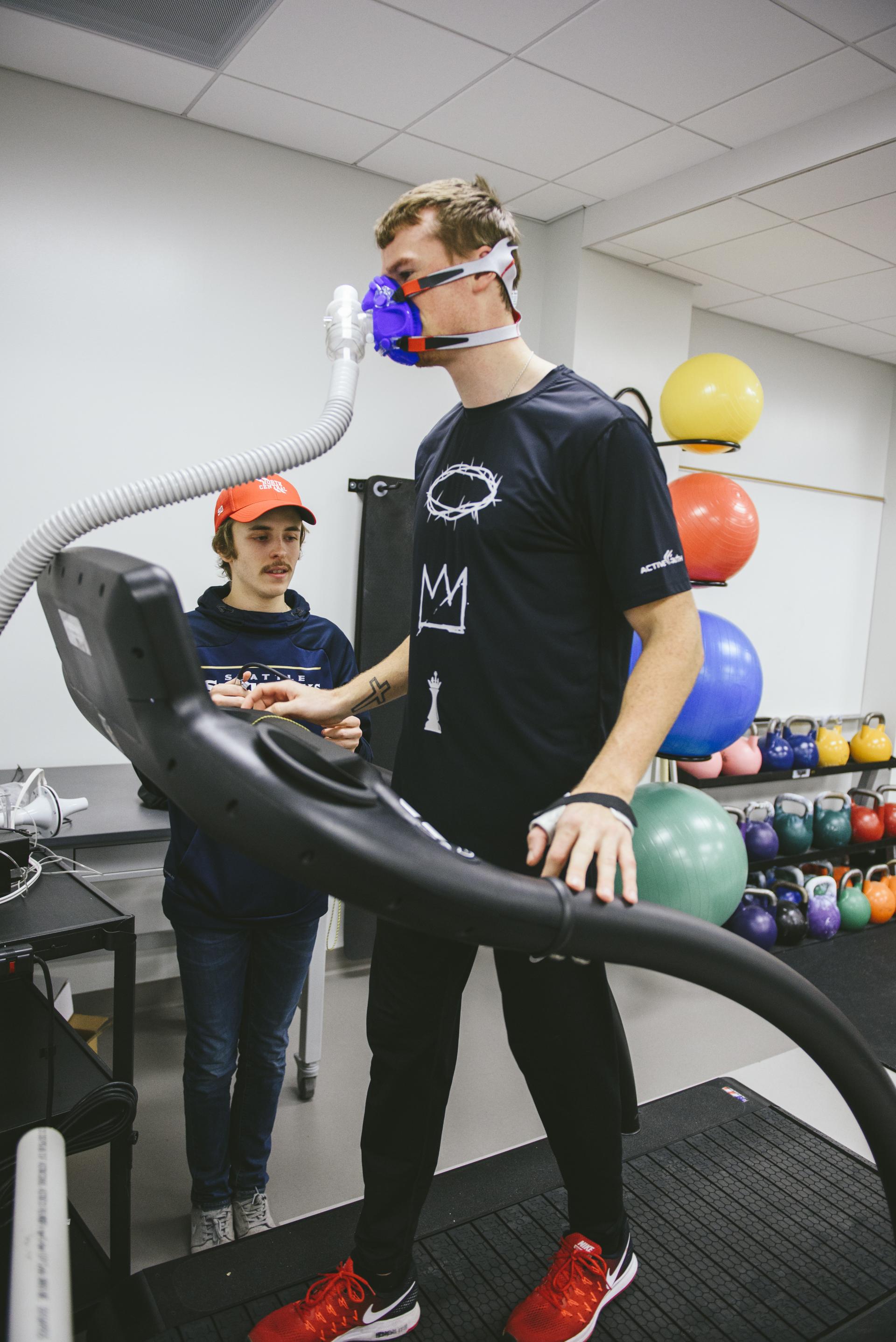
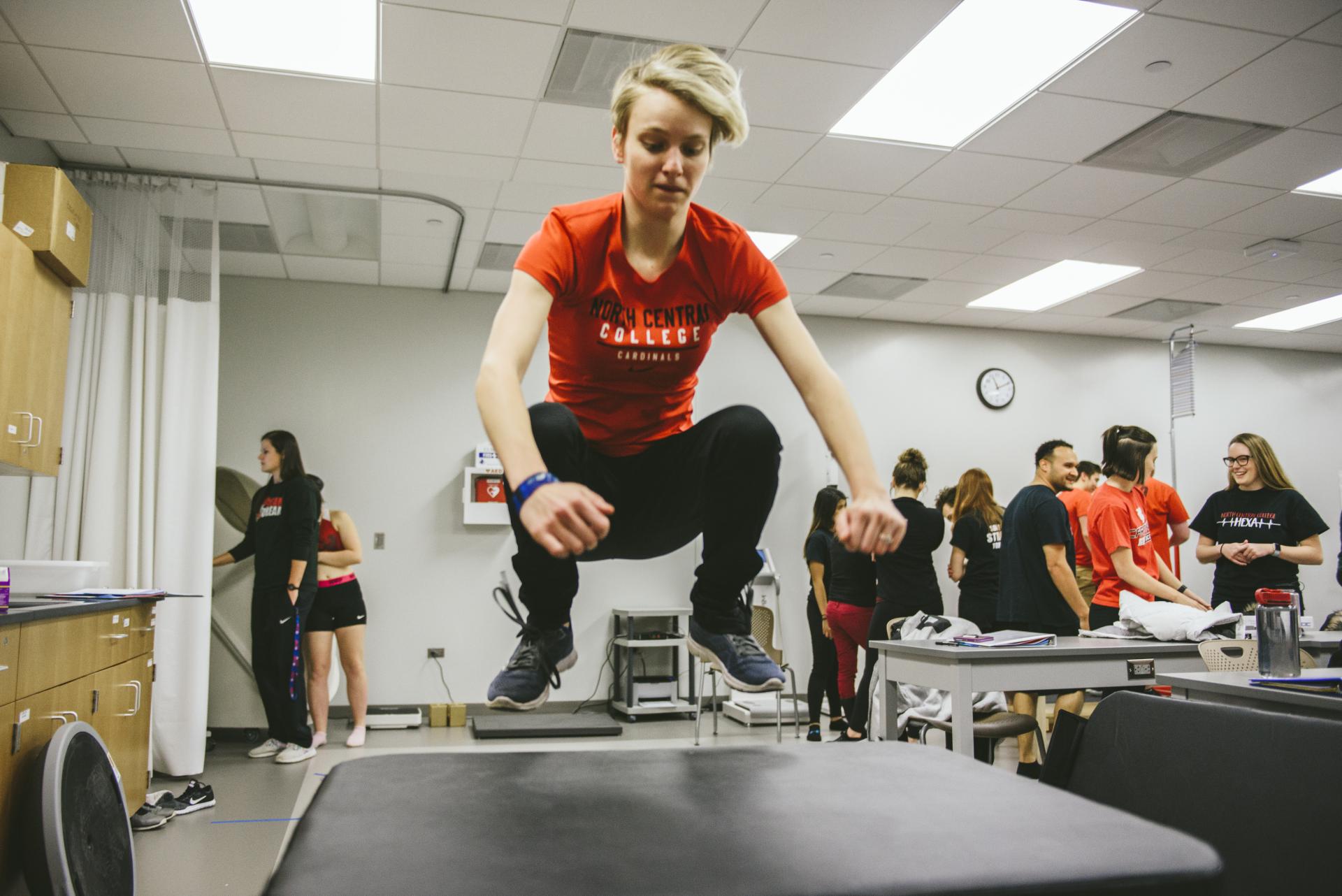
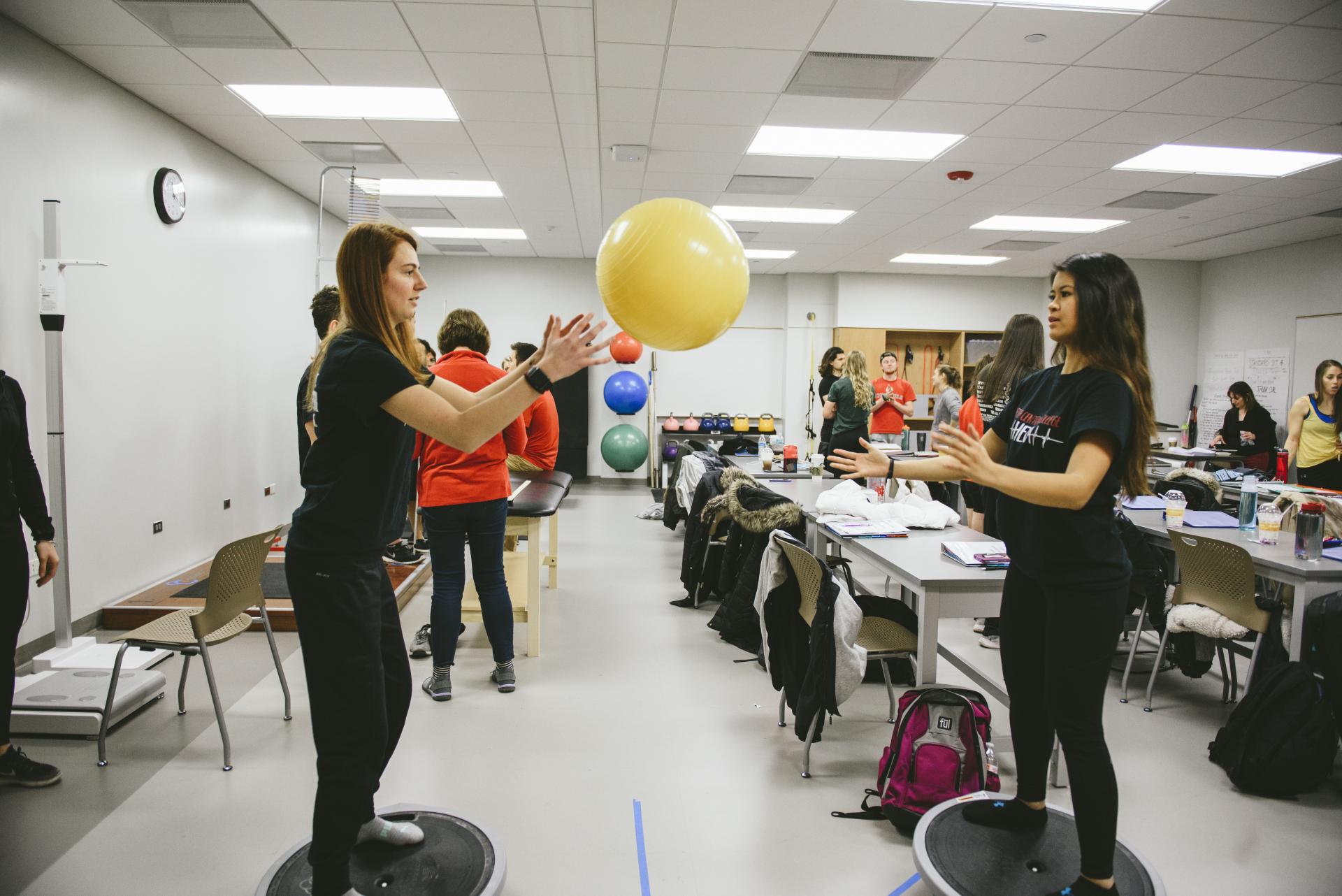
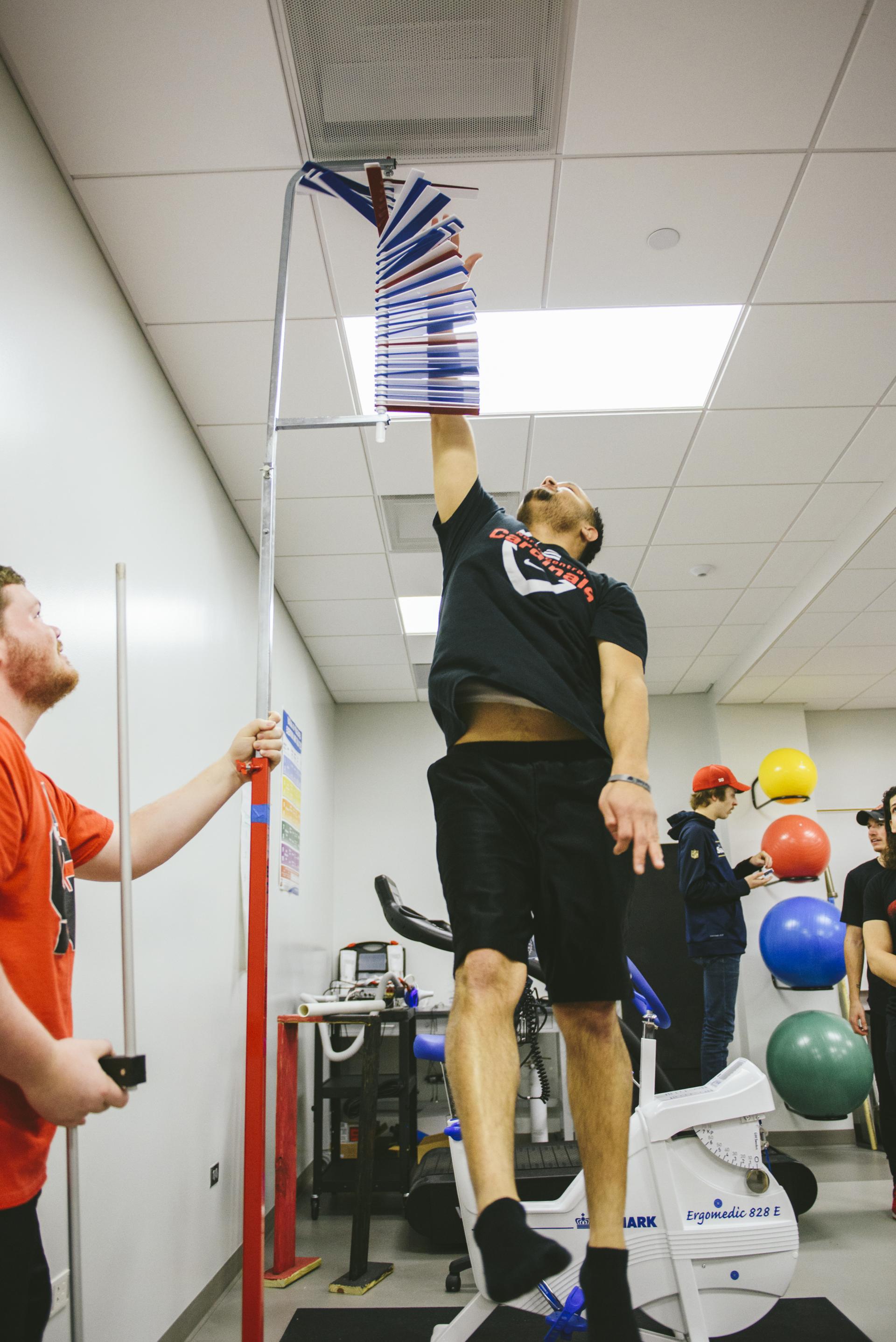
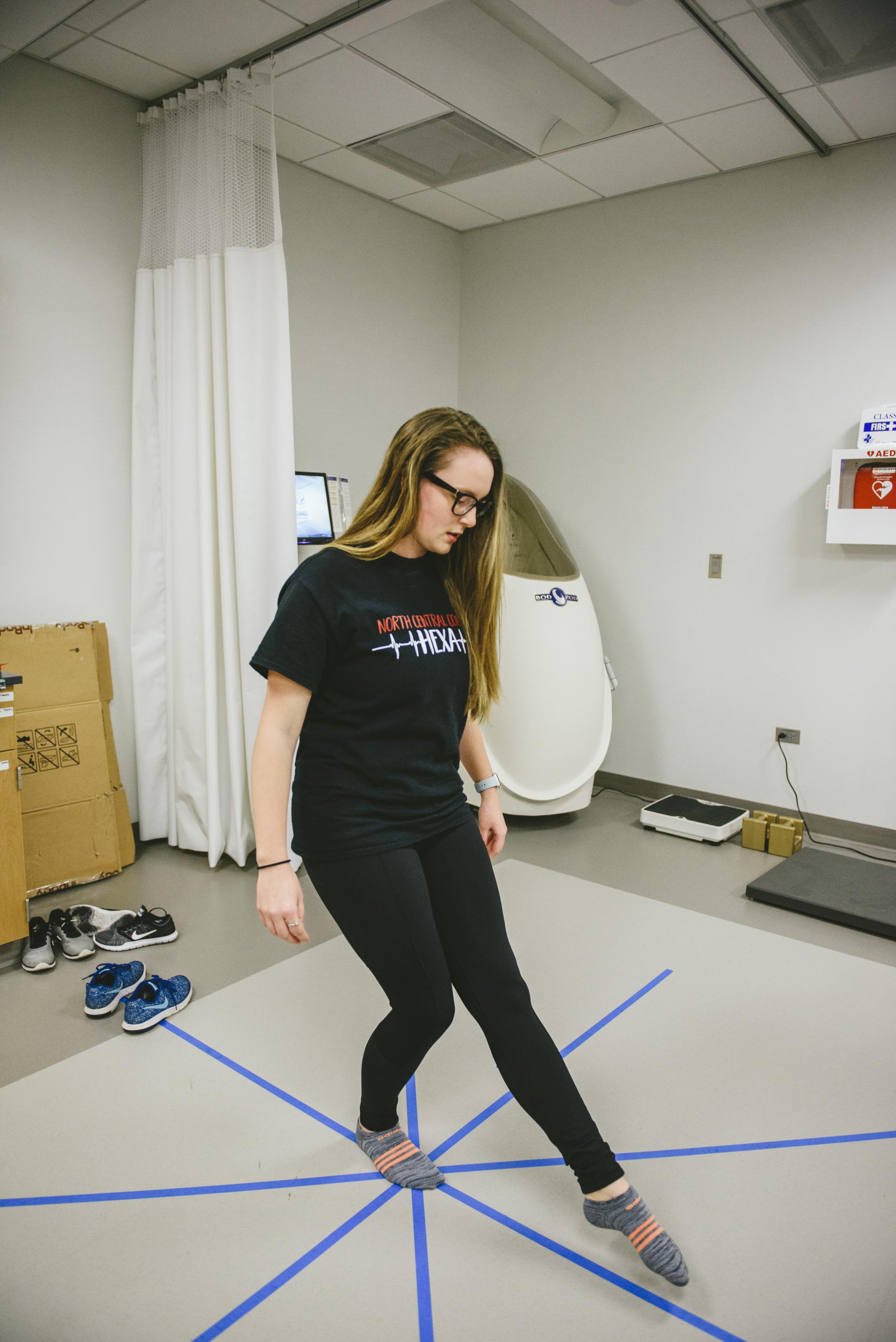
Faculty and Staff
Faculty Emeriti
Gerald Gems
Professor of Kinesiology Emeritus
A.A., Mayfair Junior College, 1975; B.A., Northeastern Illinois University, 1977; M.S., University of Arizona, 1980; Ph.D., University of Maryland, 1989
grgems@noctrl.edu
Heidi Matthews
Professor of Kinesiology Emerita
B.S., University of Wisconsin, 1981; M.S., University of Arizona, 1982.
hmmatthews@noctrl.edu
Extra-curricular and professional activities that will enrich your exercise science education.
HEXA (Health and Exercise Association)
- This organization is open to student majoring in exercise science or who are interested in learning about a career in health and exercise. Among other things, the group invites professional speakers to campus, visits fitness and human performance training facilities, attends professional meetings and seminars, and serves as a networking resource.
PHO (Pre-Health Organization)
- PHO is a student-run organization that provides helpful information, valuable resources, and amazing opportunities to North Central College students who are interested in entering health-related careers such as medicine, dentistry, physical therapy, optometry, veterinary medicine, podiatry, and much more!
Cardinal Fit
- Cardinal Fit is a nationally recognized program that provides exercise science students with opportunities to gain valuable practical experience throughout their curriculum! By performing fitness orientations, fitness testing, and designing programs for the campus community members, under the guidance of expert faculty, both students and community members gain value from the Cardinal Fit program.
Internships
- Exercise Science students complete a full semester, 360 hour internship as a culminating experience. With the help of the program's Field Experience Coordinator, students provide input into their ideal internship setting. Because Naperville is located in the heart of Chicago’s large metropolitan area with access to many of the Midwest’s premier corporations, park districts, community centers and professional sports teams, there are plenty of opportunities. Internships are available in health clubs, corporate wellness centers, performance enhancement centers and group exercise programs.





